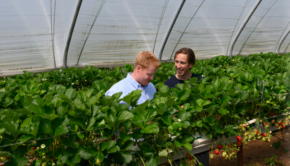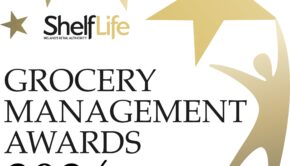It’s Christmas!

In a series of interviews ShelfLife asks the experts of the trade about their predictions for the approaching festive sales season, what to expect in-store this Christmas and what they expect from 2010
16 November 2009
David McGee, director, PricewaterhouseCoopers Retail and Consumer Group

David McGee
At PwC’s first ever Retail Executives Retreat this year, advisor David McGee heard from some of the largest retailers operating in Ireland and discussed what they should be doing now.
“At this stage we assume you’ve done all the obvious things: you’ve taken out the obvious costs; you’ve tackled your head count, bonuses or anything discretionary on your payroll; you’ve done what you can around your rents; and we assume that you’ve positioned yourself with some kind of a value offer.”
Now, says McGee, the challenge is “thinking to the next stage, which is about trying to anticipate what the consumer really needs and wants.” It’s time to “go back to the core of retailing” and start really listening to your customers. And there are many ways to do this.
“We advised Irish retailers to find out what people are saying about them. What’s being blogged about them, what’s going on out there? Explore other ways of engaging with the dialogue around them, as well as getting out there and walking the shop floor, like the old Feargal Quinn style. Listen to your staff and, in particular, listen to your customers.”
Attracting new customers
As McGee points out, learning what consumers want has never been more important than now, when the pool of spenders is shrinking, along with their pool of cash.
“You’ve got the customers who are loyal to you; they’re going to spend as much as they can but they are spending less. You have to tap into the people who do spend in your category but not with you, and that means changing your offer.
“You have to find the people that spend maybe 10 or 15% with you and find out where are they spending the rest of the money. What’s that offer? What could you do there?”
One very effective way to better understand customers is simply to ask them. McGee referred to large studies of browsing shoppers conducted in the UK, to find out why these consumers left a certain store with little or nothing and where they eventually did spend their money.
“We aren’t proposing that people go off and do massive studies but just to get that dialogue going with their customers and understand where the gap is.”
Know your margin
Providing value is obviously another necessity for every retailer this year, although McGee argues that it should not itself become the goal of business, regardless of the trading climate.
“Value is important, let’s be absolutely clear on that. It’s just that there will come a time again when you’ll want to start managing your price better, so don’t make it a race to the bottom. Don’t get sucked into blindly chasing value.
“If you were to boil it down to two pieces of advice for anyone in retail; number one, make sure you’ve got the right information about what’s really going on in your margin. That comes down to IT systems and having those systems in place so you can really understand: what does your basket margin look like? What does your typical customer look like? Where are the pools of margin sitting in your business?”
Retailers running heavy promotional cycles without this analysis have no idea if this activity is actually driving additional revenue, says McGee. “You’re flailing around in the dark, you’ve no idea what’s going on. Whereas the best in class will know how to isolate their margin by customer, by type of product, by store, by area within the store.”
McGee’s second piece of advice lies on the buying side: “Get out there and renegotiate everything.” This includes costs suppliers may be carrying on your behalf, such as taxes and customs excise, shipping and packaging costs, and even the cost of gathering and sending data. Retailers should partner with their suppliers to understand and reduce all costs along their value chain wherever possible.
Christmas and beyond
According to McGee’s forecast, this Christmas is going be “interesting,” or in other words, tougher than last year. With the worst of the pain yet to come, spending last Christmas was not down by as much as it could have been. This year will present a more realistic reflection of the economic environment we’re in.
“People are still going to buy across all the categories that they would have traditionally bought in, but there’s going to be pressure on everybody, they will spend less.”
One positive hope however, should the banks regain liquidity with the establishment of NAMA and should public finances be stabilised, consumer confidence will begin to return. Better again is that the rate of personal saving over the last year has shot up to approx 13%, which means there is cash to spend should people have the confidence to spend it.
“There’s a latent demand there and I think some of that would unlock if there was confidence.”
On the business side of things meanwhile, McGee has already received enquiries signalling that some retailers are starting to think about possibly returning to growth next year, or at least thinking about how to begin the process.
“These are still just enquiries but people are putting together their budgets for next year and are thinking, ‘we can’t cut anymore, we have to start thinking about how we can grow the top line.’” These are early signs that “we’re starting to get towards the end.”
“While they still have to get over this Christmas, businesses are prepared for it. They’ve battened down the hatches and they’ve really tackled costs. I think it’s going to be tough but I think we’re ready for it.”
James Wilson, trading director, Superquinn
Superquinn seriously upped the ante last Christmas, launching 50 new lines of festive food to create its biggest ever Christmas offering. In advance of this year’s season we spoke to trading director James Wilson to see what’s in store for 2009.
Has Superquinn added to or changed the offer this Christmas?
We will have about the same number of lines as last year. There were a few lines that we felt were a bit expensive for the times so they’ve been taken out, and we’ve sharpened up a few price points on some products.
We’ve also introduced a few cheaper options; we’ve got an entry price Christmas pudding and Stollen cake. So for people looking around for bargains, we’ll have a few options for them. We also sharpened up some of our prices on things like cheese boards, just to make them a little bit more affordable, but still the same quality.
We’ve taken the view that it’s better to have a few lower price points in our range while still offering the opportunity for people to treat themselves at Christmas because I think they probably still will. It’s just that we want to make sure that we’re catering as much as possible for the people that are economising.
What are your predictions for Christmas 2009?
The budget is coming on 9 December so potentially there’s going to be some impact on incomes again. There is going to be some frugalness this year.
I think you’ll have two types of shopper: those who plan early, order their turkey, pay for it in instalments, and have it all sorted; then there’ll be the others that leave it until the last minute and hope for some bargains.
I think it’s going to be a mixed bag. A lot of people in a recession go back to traditional values and will have a traditional Christmas, which will suit us nicely. They’ll want to have a special meal and treat their families; they’ll want a better quality product. So we’ll benefit from that.
On the flip side though, there will be quite a few people who’ve had their income reduced or are out of work, so they’ll be looking for bargains and will probably leave it very, very late to make their decisions.
What is Superquinn’s point of difference?
We won about 40 awards this year, mainly on the SQ ranges. No retailer has ever won 24 awards in one sitting before (International Great Taste Awards)… We always were set apart on quality but it’s nice to get the recognition, especially so close to Christmas.
So we’ll be running an award-winning foods campaign around December time, and then we’ll add on to that with The World Cheese Awards and the Irish (Blás na hEireann) awards.
We’ve also put together a complete brochure for our Christmas ranges that we’re going to mail to 500,000 homes, which we’ve never done before. That will allow people to order their turkeys and hams and plan early, and it will also showcase all the product in our shops. And if they order early we’ll give them a 10% discount as well.
I think we will have the best fresh Christmas offering out there this year. The others will be good but I do think we’ll have the edge in terms of quality.
How have consumers responded to the new private label lines?
Very good. This year our own label sales are up about 50% which is incredible. We launched new product, such as frozen food, dairy, and other grocery products; we’ve never had own label in these areas before. Next year we hope to launch somewhere in the region of 1,100 own label products, so we will have a common lower tier. At the moment we have Euro Shopper, Farm Value, Market Value, and we have some tertiary products. So we’ll tidy all that up and then on top of that we’ll have the core own label.
We don’t want to stray too far away from the quality offering, what we want is to offer Superquinn quality but give people the chance to have it at a lower price.
Also, we are looking at introducing other ranges that are a bit different around the store. At the end of the day, people who come to Superquinn want the complete shopping experience, so we do need to have different ranges.
John McAllen, commercial director, Barry Group
Barry’s has taken “a sensible approach” to Christmas this year, according to group commercial director John McAllen. In addition to early seasonal promotions, a comprehensive value offering across the store in order to attract footfall and ensure consumers do “shop the shop” is what the wholesaler believes will help its retailers get the most from Christmas 2009.
What is the Barry Group planning for this year’s festive season?
What we’ve found in our business is that people have become much more price conscious so, with that and the festive season in mind, we’ve done a number of things. First of all, as a marked difference for us, we brought forward our Christmas planning and we’ve put Christmas lines in stores in the last number of weeks (from mid-October). We’ve come out with some very strong promotional activity around some of the key seasonal lines and, in addition to bringing the promotional period forward, we’ve up-weighted that activity in terms of the RSPs that need to be hit.
We’ve supported all of our stores with increased amounts of point of sale, more shelf-talkers and in-store materials, and we’ve also created a bespoke flyer for the Christmas season.
In addition to this seasonal activity, in general we are very aware of the pricing and promotional activity that’s out there, and we are passionate about supporting the retailer. Number one, this means being competitive, and number two, giving the retailer a real point of difference.
So we have put an awful lot of planning into Christmas, we signed off on it by around June this year. As we get into the season, different opportunities may present themselves and we will try to avail of those too.
Are there any potential pitfalls for retailers during this period?
In the past a lot of retailers would have been quite bullish during the Christmas period, buying large quantities of stock. I think retailers are being more pragmatic now. They’re buying their requirements for the seasonal period fortnightly or weekly, seeing how the promotional activity goes versus rate of sale on normal product and then replenishing as they need. So I think they’re being a bit more cautious now.
Really, it’s in nobody’s interest to see a retailer left with seasonal stock when the season is finished. So we’re giving advice to our retailers, we’re working with them to make sure that they have the appropriate stock levels to make sure that they don’t end up in that situation. While we’re aggressive in our promotional activity and increased point of sale this Christmas, we also want to ensure that our retailers are realistic in terms of their requirements.
Do you expect to see a return to growth in 2010?
Unemployment has risen and continues to rise, we’ve seen the impact of levies on people’s net income, and then we look at the coming budget that’s now hanging over everybody which is likely to take more cash out of people’s net pay, so from our perspective, we don’t expect to see growth in the market place in 2010. When you look at all of those factors and you look at consumer sentiment, I think people are far less likely to splurge or spend sums of money in the coming year in the way that they have in the past.
Kevin Boyle, category management activation, Nestle Ireland
What is Nestle’s strategy for Christmas this year?
Firstly, to capitalise on the growth within the novelties market. Secondly, to offer extra value to consumers, with 50% free on After Eight (300g). Thirdly, to continue to deliver innovative packaging solutions that retain quality whilst becoming even more environmentally friendly. For example, there is no plastic in our selection box packaging. And lastly, we want to make a splash with the return of our Classic Black Magic Range, back by popular demand!
What are the biggest opportunities for the confectionery category during the season?
One of the biggest opportunities this season is within the novelties market, which has grown significantly at + 6% in 2008. Nestle can capitalise on novelties, with the largest range of giant tubes in the market. We also continue to build on innovation with additions to the novelties range for 2009. The Smarties Penguin Figure is something that appeals to mums and is fun for kids. It presents an ideal opportunity to drive incremental sales; 50% of consumers said they would buy it in addition to other confectionery gifts. It’s not just about the chocolate, it is about the interaction and playful value that children get from the gift. That is the essence of novelties.
Do consumers still want to see new products?
Yes. Particularly in the current climate, NPD can act as an important tool that can be used to stimulate the market. The reaction to Rowntrees Randoms has been very positive. Randoms ticks all the boxes in terms of innovation, fun and consumer appeal. Opportunity gaps in the market will always present themselves and with Rowntrees Randoms we saw the need for a variety style sugar offering. Consumers are constantly on the lookout for something new and different and it’s important that we oblige them.
Does Nestle plan any new launches or other NPD in the near future?
With respect to NPD for Christmas this year: in gifting, Nestle has gone back to basics with Black Magic Classic Favourites, re-introducing the brand’s heritage with six varieties of classic favourites from the original Black Magic recipe. A variety of flavours including Caramel Caress, Dreamy Fudge, Whole Hazelnut Praline and Orange Sensations; classic favourites are back by popular demand. Quality Street is a must stock with a new 400g carton format made from fully recyclable materials. Their broad appeal makes them a favourite with consumers. The number one after dinner mint, After Eight has an added value pack this Christmas with 50% extra free offering more value to consumers.
Will Cortlet, senior category marketing manager, Diageo Ireland
What drinks categories will be key for driving sales this Christmas?
Obviously the Christmas period is key for the total drinks sector with shoppers purchasing brands across the portfolio for a range of in-home entertainment occasions.
If I had to pick one, however, I would say that sprits are particularly relevant, as they over index as a percentage of sales across the Christmas trading period. Within spirits, brown spirits and creams represent a massive opportunity for retailers to exploit the gifting culture in this market.
Will price be the most important factor for the season?
Yes, price will be important but many shoppers won’t want to sacrifice buying quality, well-trusted brands at Christmas. They will be looking to get the best possible value from their favourite brands. There will be lots of great offers in the market but from a retailer point of view there are many other drivers that will influence where a shopper chooses to shop at Christmas, such as having great availability, convenience, ease of shop and choice. Shoppers will weigh up all these factors when deciding where to shop and what to buy.
Will Diageo be investing heavily in consumer marketing for ROI this Christmas?
We will be continually investing across all our brands in particular Guinness, Budweiser, Smirnoff and Baileys.
What does Diageo forecast for the Christmas sales period?
We recognise that this is set to be one of the toughest trading Christmas periods in recent memory. That said, we are still gearing up for success. We are investing at the same level as previous years in in-store support and merchandising assistance for stores in the run up to Christmas, in an attempt to ensure both convenience and availability.
Are there launches or other NPD planned for 2010?
We have recently invested in three separate areas of NPD in the ROI THT market. With the launch of pre mixed cans, Smirnoff cocktails and Captain Morgan 20cl, our focus for the immediate future will be to ensure that enough support is given to these innovations to allow them to gain a foothold in the minds of the Irish consumer. n



 Print
Print






Fans 0
Followers